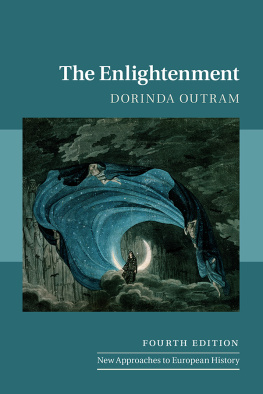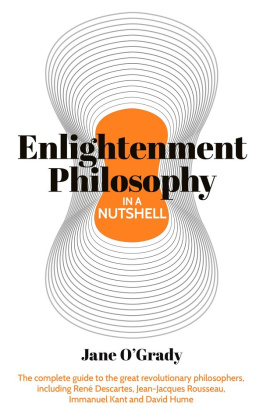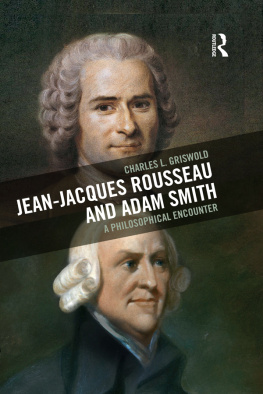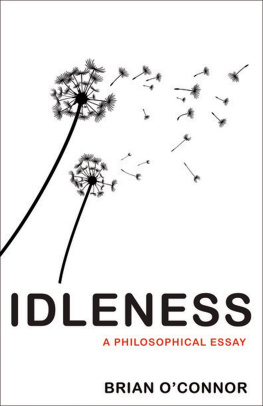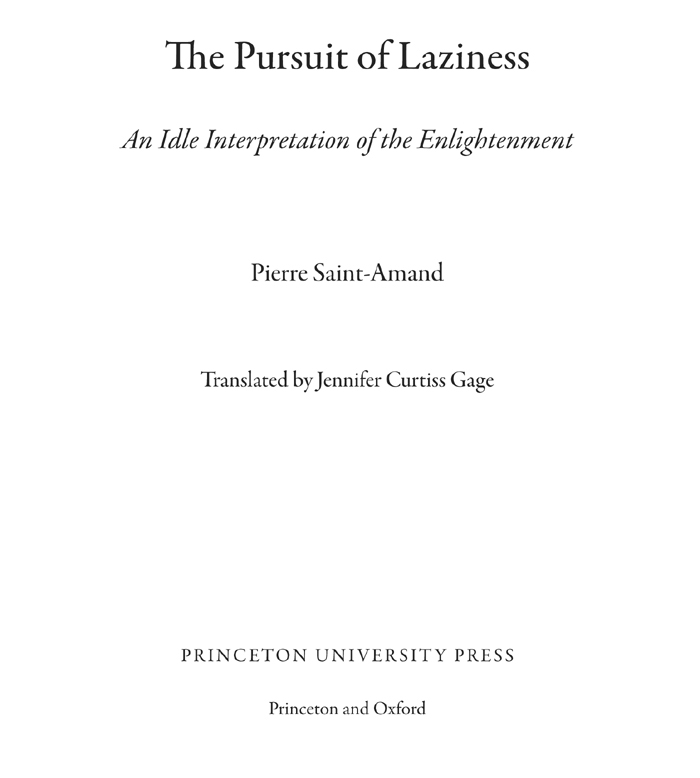The Pursuit of Laziness
The Pursuit of Laziness
An Idle Interpretation of the Enlightenment
Pierre Saint-Amand
Translated by Jennifer Curtiss Gage
PRINCETON UNIVERSITY PRESS
Princeton and Oxford
Copyright 2011 by Princeton University Press
Requests for permission to reproduce material from this work should be sent to
Permissions, Princeton University Press
Published by Princeton University Press, 41 William Street, Princeton,
New Jersey 08540
In the United Kingdom: Princeton University Press, 6 Oxford Street,
Woodstock, Oxfordshire OX20 1TW
press.princeton.edu
All Rights Reserved
Library of Congress Cataloging-in-Publication Data
Saint-Amand, Pierre, 1957
The pursuit of laziness: an idle interpretation of the Enlightenment /
Pierre Saint-Amand; translated by Jennifer Curtiss Gage.
p. cm.
Includes bibliographical references and index.
ISBN 978-0-691-14927-1 (hardcover: alk. paper) 1. EnlightenmentFrance.
2. Laziness. I. Title. II. Title: Idle interpretation of the Enlightenment.
B802.s25 2011
190.9033dc22 2010036754
British Library Cataloging-in-Publication Data is available
This book has been composed in Garamond Premier Pro
Printed on acid-free paper.
Printed in the United States of America
1 3 5 7 9 10 8 6 4 2
The Idler, though sluggish, is yet alive, and may sometimes be stimulated to vigor and activity. He may descend into profoundness, or tower into sublimity; for the diligence of the Idler is rapid and impetuous, as ponderous bodies forced into velocity move with violence proportionate to their weight.
Samuel Johnson, The Idler, Numb. 1, Saturday, April 15, 1758
Contents
Idle Nation
[1]
The surprises of Laziness
Marivaux
[2]
Chardins Slowness
[3]
The Great Project of an Idle Life
Rousseau
[4]
Paradox of the Idler
Diderot
[5]
Philosophy on the Pillow
Joubert
Toward Moderation
Acknowledgments
This book has been long in the making. My own laziness might be partly to blame. But I would like to thank those who supported the project and have been patient in seeing it through: Nancy Armstrong and Len Tennenhouse, Marcel Hnaff, Ourida Mostefai, Virginia Krause, Jacques Khalip, Dena Goodman, Susan Stewart, and Sina Najafi. I had the opportunity to present materials from this book at different venues. They include: the University of Pennsylvania, Cornell University, the French Culture Workshop at Stanford University, the University of Notre Dame, Johns Hopkins. I thank all those who guided me with suggestions along the way.
I could not be more grateful to Rob Tempio at Princeton University Press for his early interest, encouragement, and the care with which he followed through. This book could not especially be what it is without the comments and helpful suggestions from the two anonymous readers. They offered enlightening ways to better the manuscript and they have my infinite gratitude. All remaining shortcomings are of course my own entirely. As always, I owe a special debt of recognition to my translator, Jennifer Curtiss Gage, for her gift of words, her patience, meticulousness, and her fidelity. I am grateful to the office of vice President of Research at Brown University for providing the grants toward the translation. Finally, my thanks are due to Karen Verde for her methodical and careful editing as well as to David Luljak for preparing the index.
A part of the third chapter appeared previously as Freedom and the Project of idleness in Rousseau and Freedom, ed. Christie McDonald and Stanley Hoffman (Cambridge: Cambridge University Press, 2010), 245256. it is reprinted with permission of the Press. An early version of a section of the third chapter appeared as Reveries of idleness in Approaches to Teaching Rous-seaus Confessions and Reveries, ed. Ourida Mostefai and John ONeil (New York: Modern Language Association of America, 2003), 127131.
The Pursuit of Laziness
Introduction
Idle Nation
Ours is the century of laziness, announces Louis-Sbastien Mercier in Mon bonnet de nuit (My Nightcap, 1784). Looking back upon the literary production of the eighteenth century, he nostalgically observes the waning of the grand intellectual projects. The age of massive tomes of philosophy, of erudite abstraction, is past; the century has now discovered the trifle, the trivial. Mercier laments the impatience of authors and readers alike. It is as if the time of work has been compressed, interrupted by the futile. He would like to restore this time to the artist, so that creation could be reclaimed through action. Mercier concludes with a morality based on usefulness and fecundity, for a proper culture of Enlightenment.
This despondent view of the century, in particular of intellectual work, might divert us from the image of a century known for bringing about a massive systematization of work, a valorization of labor that culminated in the birth of industrial capitalism. Indeed, the eighteenth century was the century of industry; as such it trumpeted the cause of action and energy. Severe measures aimed at repressing idlers remained in place for the duration of the century, alongside new strategies for economic emancipation. Such repression sought justification through various discourses, beginning with the religious. One text that exerted an influence throughout the eighteenth century (as many as four editions were published in 1743) was Antoine de Courtins Trait de la paresse (Treatise on Laziness), in which he condemns laziness in the harshest More precisely, Courtin defines laziness as a numbness, a despondency, a desolation, a weight that depletes courage and instills a repugnance for all good deeds; its hatred for work is equal to its love of rest (Trait, p. 28). The moralist sets himself the task of correcting this deadly inclination by inspiring active virtues, those of work as a duty imposed by God. For Courtin the key, in his striking phrase, is not to allow others the leisure to enjoy leisure (Trait, Avertissement, p. 5). to set man on the right path, the moralist does not hesitate to invoke a mythological model: the paragon of virtue that he proposes is none other than Hercules, the action hero par excellence.
These same values circulate in the Enlightenment discourse of emancipation, as voiced by the encyclopedists. The Chevalier Louis de Jaucourt translated the religious condemnation of inactivity into secular terms.
In his article on Paresse for the Encyclopdie of Diderot and dAlembert, Jaucourt makes an effort to distinguish between paresse (laziness) and fainantise (loafing ), which, despite their close synonymy, denote for him two different degrees of wrongdoing. If laziness concerns (the lack of ) action in mind and body alike, loafing is a vice of the body alone. For him the lazy man is
The unoccupied individual is portrayed no more reassuringly in the medical writings of the day. The inactive subject may fall prey to a whole series of illnesses: gout, stones, melancholy, madness and, the Encyclopdie adds dramatically, the despair of wasted time (oisivet, p. 446). The proposed remedy for idleness is work, the discipline of exercise which makes it possible to restore health. The disease of laziness poses a threat to culture through its decadent effeminization, its unmanning effect. This is a far cry from Hercules, the robust hero of labor.
The American Enlightenment was to embrace without reserve this idea of active application. Benjamin Franklin, shored up by the principles of what Max Weber has identified as the Protestant ethic, elevates industry as a cardinal virtue.



